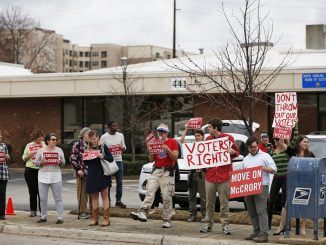RALEIGH — In the final stretch of the 2022 U.S. Senate primaries, there’s little drama for the candidates leading their respective party’s nominations.
Former N.C. Supreme Court Chief Justice Cheri Beasley has been called the “presumptive nominee” by her party since December, when Jeff Jackson quit the race and endorsed her. Jackson promptly ran for Congress following a controversial court-mandated redistricting session. Endorsed by nearly every prominent Democrat in the state, Beasley has raised money and held tightly-controlled events around the state.
“Cheri Beasley will be a great U.S. Senator for North Carolina,” Jackson said in a video. “I am going to be her first endorsement as our party’s presumptive nominee. We have to come together right now. We need to unite right now, and we need to unite behind Cheri.”
Beasley’s strategy is quite similar to the one used by Cal Cunningham in 2020. National Democrats helped clear the field for Cunningham in that race, too, save for the presence of Erica Smith, a former state senator.
Throughout 2021, as many as four Democrats seemed to be plausible nominees. Beasley, Jackson, Smith, and Joan Higginbotham, a retired astronaut with political connections in Charlotte. Married to long-time Charlotte City Councilman James “Smuggie” Mitchell, she was recruited by a PAC to join the race and appeared to be considering a run, ultimately backing down.
Smith had criticized Beasley for refusing to take positions on progressive issues such as ending the filibuster. However, she also left the race once U.S. Rep. G.K. Butterfield announced he would not seek reelection to the seat he had held for over 15 years in Congress. Smith is locked in a primary battle with state Sen. Don Davis, who is endorsed by Butterfield. Soon after, Beasley also publicly stated she supported the total elimination of the filibuster.
On the Republican side, Ted Budd’s rise to the top of the field didn’t happen all at once.
Joining the race after former U.S. Rep. Mark Walker and former Gov. Pat McCrory, he trailed them both in polls a year away from the election. Then on a warm June night in Greenville, the race was jolted by the 45th President, Donald J. Trump.
Speaking at the North Carolina Republican Party’s annual convention on Saturday night, Trump brought his daughter-in-law, Lara Trump, with him to the stage. For months, the North Carolina native had toyed with the idea of running for Senate but finally ruled it out at the dinner, saying it wasn’t the right time for her with two young children at home. When the former president took the stage to make his endorsement, the tension in the hotel ballroom was palpable.
“There’s somebody in this room that I think is very special. This man is a great politician but more importantly, he loves the state of North Carolina. This gentleman is going to be your next senator,” Trump said, giving Budd his “complete and total endorsement.”
Despite the endorsement, Budd still appeared to trail the former governor as the calendar flipped to 2022.
An early sign of momentum came when Budd outraised McCrory in the last quarter of 2021, padding his lead in cash-on-hand numbers. The delayed primary, a result of legal manoeuvring over redistricting, pushed the primary back from early March to mid-May. Then, outside spending led by the Club for Growth pummelled McCrory.
As early as the summer of 2021, the Club for Growth and its affiliated organizations signaled their intent to spend millions backing Budd. Their initial figure was $5 million, and in the time since, it has more than doubled, to over $14 million.
“Ted Budd is a true champion of pro-growth policies and we are proud to support his Senate campaign. We have already raised over $5 million for the race, and we plan to raise and spend even more,” said Club for Growth PAC President David MacIntosh in a June 30, 2021 story.
Another outside organization, Carolina Senate Fund, which was set up by McCrory backers, didn’t raise the money needed to counter the Club for Growth’s aggressive strategy.
Financed by Charlotte-area CEOs such as LendingTree’s Doug Lebda, on whose board McCrory sat on between gubernatorial runs, Carolina Senate Fund’s efforts paled in comparison to the Club for Growth.
A spate of public polling in March and April showed a “Budd surge” from leads in the ten-point range to over 20 in more recent polls.
The outside spending was a huge factor but Budd’s under-the-radar grassroots effort shouldn’t be overlooked. The campaign set up county chairs in all 100 counties and completed a 100-county tour last Friday in Camden County.
“Amy Kate and I are making new friends across the state, and we’re honored folks have volunteered their time and resources in all 100 counties to help our campaign. I know some folks mock the idea, but I can’t imagine saying you want to represent all 100 counties without making it a priority to visit all 100 counties,” Budd said in a statement.
McCrory and Walker hammered Budd for not participating in televised debates in the race but it hasn’t seemed to slow his momentum. Less than a week from the primary, Budd has closed in a win few expected when he first joined the race.



